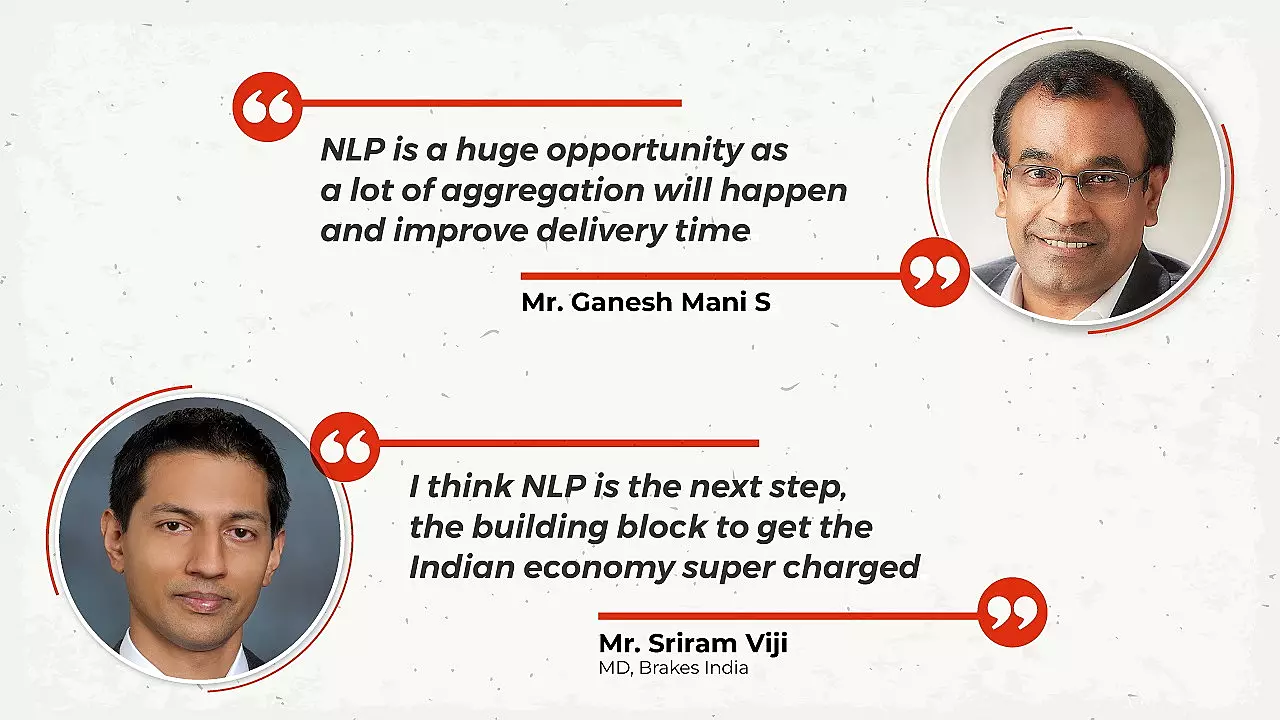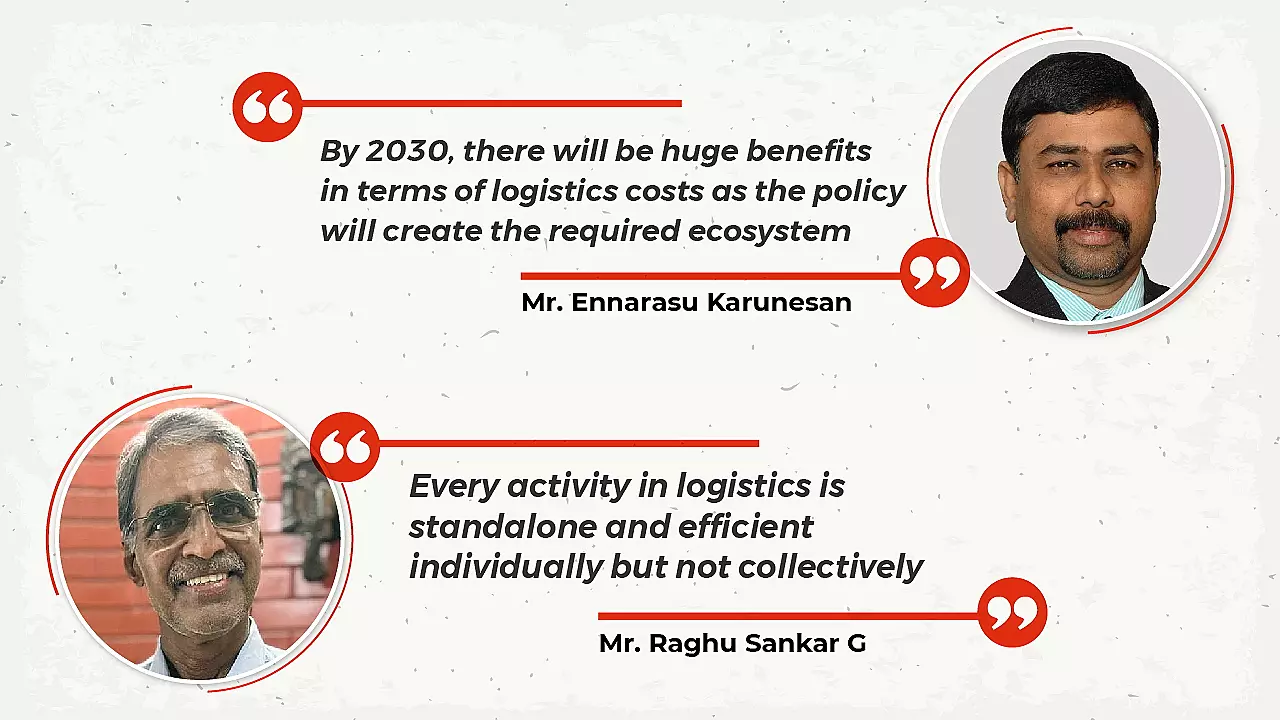|
Top minds across sectors are pleased that this has been announced but admit that there are huge challenges ahead.

The recently announced National Logistics Policy (NLP) has the potential to become a game changer for the Indian industry.
Its objective is to primarily address logistics costs which are about 14% of GDP compared to just 6% to 8% in developed nations. With the country now emerging as a manufacturing hub for a host of industries and exports slated to rise as a result, lower logistics costs will boost the competitiveness of Indian goods both here and overseas.
It will also improve efficiency across sectors while encouraging value-addition and enterprise. The Centre is now finalising the draft of the National Logistics Efficiency Advancement Predictability and Safety (NLEAPS) Act.
Mobility Outlook spoke to different stakeholders in the logistics ecosystem to get their perspective on NLP.
Ganesh Mani S, President and Chief of Operations, Ashok Leyland, said it would enable modern and efficient operations across the automotive industry. As he put it, NLP is not just about interconnecting Gati Sakthi but also emphasises on digitalisation.
“From OEMs’ point of view, this is a huge opportunity as a lot of aggregation will happen and improve delivery time. Automation has already played a huge role in logistics and digitalisation will give a further fillip to operations,' added Ganesh Mani.

Speaking from the auto component manufacturers' point of view, Sriram Viji, Managing Director, Brakes India, said NLP is very timely as the auto components industry is challenged with the cost of logistics and transportation, which is 3-4% higher compared to several other countries. NLP can help provide scale for many players in the auto component industry. Rather than being a regional player by setting up plants across the country, this enables much more seamless delivery from any location.
Shipping & Ports
Ennarasu Karunesan, Maritime & Port Expert, Founder UMK Group and IAPH Regional Representative to India, said the three pillars of NLP — infrastructure, services and human resources — are being energised to support emerging needs.
With NLP, the turnaround time at ports will reduce to less than a day by 2030, from about 26 hours now, he said. It was over a week till a couple of decades ago. Additionally, creating dedicated corridors like highways and railways would be a big booster.
On the services side, Karunesan was of the view that technological developments in port communications, national logistics port development and ULIP would create a plug-and-play system. This will take a big leap forward with artificial intelligence, machine learning and blockchain technologies.
As for human resources, he said the country has already moved from a labour to digital workforce though the need of the hour is skill and knowledge development programmes.
A V Vijayakumar, MD, Paramount Shipping & Immediate Past Chairman of Federation of Freight Forwarders’ Associations in India, said NLP is linked to the Gati Sakthi programme. This will mean creating infrastructure and coordinating with other ministries such as Railways, Ports and Waterways, Highways, Civil Aviation, Commerce and Finance.

“Multimodal transport and ULIP digitised the entire spectrum of logistics. Connecting about 200 airports under UDAN, coastal shipping (to reduce road transport), simplifying customs procedures etc are part of NLP. All this will reduce logistics costs and time,” he said.
Challenges Ahead
According to Ganesh Mani, India successfully implemented Aadhar and GST, which were more complex, but NLP is one step ahead as multiple agencies, stakeholders, and physical entities are involved. Doubtless, the challenges will be more but can be met comfortably going by the Aadhar and GST experience. “With all stakeholders involved, implementation will be faster,” he said.
Sriram Viji said the country has developed well with the implementation of GST and e-way bill, which have simplified the movement of goods. 'I think NLP is the next step, the building block to get the Indian economy super charged. It will make India competitive globally.'
Raghu Sankar was concerned about implementation. “Our intentions are good but implementation is always bad. There is a huge gap between thinking, conceptualisation and execution,” he added.
Even while NLP strives to reduce logistics costs, the “compliance cost” is invisible and inflates overall costs. Raghu Sankar said India has not developed software to handle these requirements comprehensively. “We are moving in the right direction but I am not sure if the support structures will fall in line,” he said.
Potential Pitfalls
Ganesh Mani was hopeful that with all stakeholders jointly focusing on the benefits in store, challenges can be overcome.
Raghu Sankar said every activity in logistics is standalone and efficient individually but not collectively. NLP aims to bring collective efficiency by connecting different elements digitally. However, the digital system available today is standalone, and there is no comprehensive logistics model that can be linked to activities such as transportation, warehousing etc.
For instance, the Customs introduced ‘faceless assessment,’ which is conceptually good, but the gap between policymakers and implementors can come in the way of accomplishing objectives. Moreover, State Governments will have to work in tandem, given that Tamil Nadu, Telangana and Karnataka are working on their own logistics policies.
'While we fully support the ambitions of NLP, we should not allow procedural roadblocks to hinder the progress made so far and charted out for the future. We need clear milestones that the whole industry can work towards,” signed off Vikash Agarwal.
Courtesy: Mobility Outlook
|
